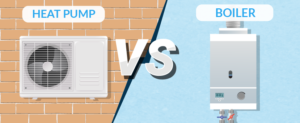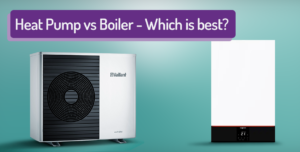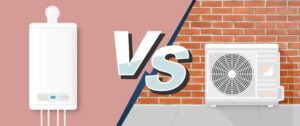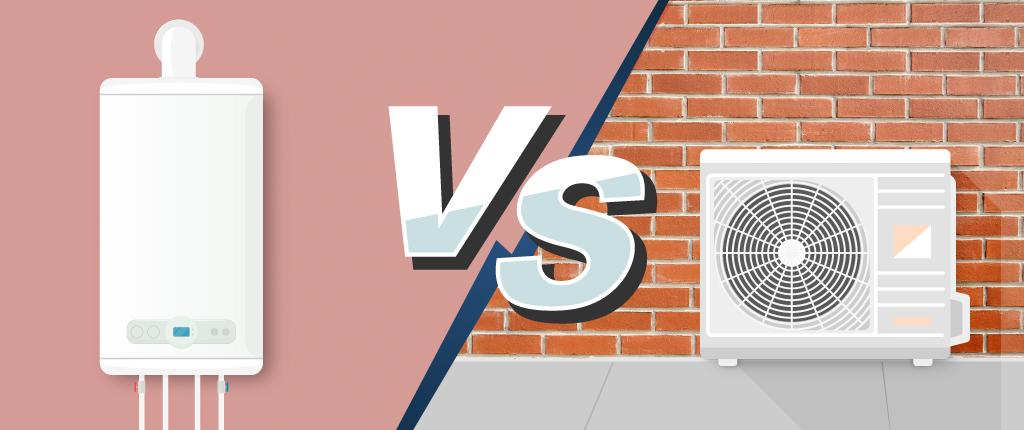When it comes to creating a warm and cozy haven in your home, choosing the right heating solution is of paramount importance. The comfort and well-being of your family depend on it.
However, with numerous options available in the market, selecting the most suitable heating system can feel like navigating a treacherous sea of choices. Fear not, for this comprehensive guide will shed light on two popular contenders: the Boiler and the Heat Pump.
The Importance of Choosing the Right Heating Solution for Your Home
In our ever-changing climate, where winter chills penetrate even the sturdiest walls, having an effective heating system is crucial to maintain a comfortable living space.
A well-planned heating solution not only ensures warmth during those frosty months but also contributes to energy efficiency, cost savings, and environmental sustainability.
But beyond mere practicality lies a deeper significance – our emotional connection to our homes. Our abodes are sanctuaries where cherished memories are made, and every corner bears witness to life’s joys and sorrows.
It is within these walls that we seek solace from life’s tribulations and create havens of tranquility where love blossoms and dreams take flight. The warmth that emanates from a reliable heating system fosters this sanctuary-like atmosphere that nurtures happiness, comfort, and wellbeing.
Overview of Two Popular Options: Boiler and Heat Pump
Navigating through the vast landscape of heating solutions can be overwhelming without proper guidance. Amongst various options available today, Boilers and Heat Pumps emerge as two particularly popular choices due to their reliability, versatility, and efficiency.
A Boiler is a time-honored classic in home heating systems. Utilizing combustion processes or electric resistance elements, boilers generate hot water or steam which then circulates through pipes, delivering warmth to radiators, underfloor heating systems, or even providing hot water for showers and faucets.
On the other hand, Heat Pumps employ a different approach by utilizing refrigeration technology to extract heat from the surrounding environment and transfer it into your home.
This versatile system can provide both heating and cooling throughout the year. As we journey deeper into the realm of boilers and heat pumps, let us explore their inner workings, advantages, considerations to bear in mind when selecting between them, and delve into fascinating niche subtopics that offer even greater possibilities for creating an optimal heating solution for your home.

Understanding Boilers
Definition and Function of a Boiler
A boiler, in the context of heating systems, is a device that generates heat by burning fuel or through electric resistance. Its primary function is to provide warmth and hot water for residential or commercial spaces.
Boilers are typically found in basements or utility rooms and are connected to a network of pipes that distribute heated water or steam throughout the building. The heat generated by boilers can be used for various purposes such as space heating, water heating, and even powering certain appliances.
Types of Boilers: Conventional, Combi, System
When it comes to boilers, there are several types available on the market catering to different needs and preferences. The three main types are conventional (regular) boilers, combination (combi) boilers, and system boilers. Conventional boilers are the traditional type commonly seen in older homes.
They require both a hot water storage tank and a cold-water storage tank (usually located in the loft), ensuring a ready supply of hot water whenever needed. Combi boilers, on the other hand, combine both heating and hot water functions into one compact unit without the need for additional tanks.
This makes them particularly suitable for smaller properties with limited space. System boilers work with an external cylinder to store hot water but do not require any cold-water storage tanks like conventional models do.
How Boilers Work: Combustion Process, Heat Transfer and Distribution
Boilers operate based on a relatively simple principle: combustion to generate heat energy which is then transferred to either water or steam. The combustion process begins as fuel (such as natural gas or oil) is burned within the boiler’s combustion chamber.
This releases heat energy which then interacts with specially designed tubes or plates within the boiler’s heat exchanger. These tubes/plates facilitate heat transfer from the combustion gases to the water/steam.
As the water or steam absorbs this thermal energy, it undergoes a phase change from a liquid to a gas (in the case of steam) or simply becomes heated (in the case of hot water).
The resulting heated water or steam is then distributed through a system of pipes to radiators, underfloor heating systems, or other heat emitters within the building.
Advantages of Boilers: Efficiency, Reliability, Versatility
Boilers offer several advantages that make them an attractive heating solution for many homeowners. Firstly, they are known for their high energy efficiency. By effectively combusting fuel and transferring heat with minimal losses, boilers can achieve impressive efficiency ratings.
This not only helps reduce carbon emissions but also results in cost savings on energy bills. Moreover, boilers are renowned for their reliability as they have fewer moving parts compared to other heating systems.
This durability translates into longer lifespans and reduced maintenance requirements.
Additionally, boilers offer versatility in terms of fuel options as they can be powered by various sources including natural gas, oil, electricity, and even biomass.
This flexibility allows homeowners to choose an option that aligns with their preferences and local availability. Overall, understanding boilers is crucial when considering your home’s heating needs.
Their definition and function help clarify how they work while knowledge about different types provides insights into which might suit your property best.
Furthermore, recognizing the advantages of boilers permits informed decision-making when navigating towards an efficient and reliable heating solution for your home.

Exploring Heat Pumps
Definition and function of a heat pump
Heat pumps are innovative heating systems that utilize the principles of thermodynamics to transfer heat energy from one place to another. Unlike boilers, which generate heat through combustion, heat pumps work by extracting thermal energy from the surrounding environment and transferring it indoors to warm your home.
Acting as a type of “reverse” air conditioner, a heat pump can also be used for cooling during hot summer months. The key component that allows this process is the refrigerant, a substance with properties that allow it to change phase easily at low temperatures.
Types of heat pumps: Air-source, Ground-source (Geothermal)
There are two main types of heat pumps: air-source and ground-source (geothermal). Air-source heat pumps extract thermal energy from the air outside your home and transfer it indoors.
These systems typically consist of an outdoor unit containing a fan, compressor, and condenser coil along with an indoor unit responsible for distributing the warm or cool air throughout your home.
On the other hand, ground-source or geothermal heat pumps tap into the relatively stable underground temperature to extract or dissipate thermal energy effectively. This type of system utilizes buried pipes called ground loops that circulate a fluid carrying thermal energy between your home and the earth.
How heat pumps work: refrigeration cycle, extracting and transferring heat energy
Understanding how a heat pump works involves comprehending its refrigeration cycle. The cycle begins with the evaporation of refrigerant in an outdoor coil within the system’s evaporator unit.
As the liquid refrigerant evaporates into gas form due to low pressure and temperature conditions, it absorbs thermal energy from its surroundings. The gaseous refrigerant is then compressed by a compressor in order to increase both its pressure and temperature significantly.
This heated gas passes through a condenser coil, where it releases the absorbed thermal energy into the indoor space or transfers it to a water tank for domestic hot water purposes.
The refrigerant returns to its liquid state as it flows through an expansion valve, completing the cycle and preparing for another round of heat extraction and transfer.
Advantages of heat pumps: energy efficiency, environmental friendliness, versatility
Heat pumps offer several advantages that make them an appealing heating choice for homeowners. One key advantage is their remarkable energy efficiency. Since heat pumps primarily transfer heat instead of generating it through combustion, they can achieve high levels of energy efficiency, typically exceeding 300%.
This means that for every unit of electricity consumed by the system, it can produce more than three units of usable heat energy. This efficiency translates into lower energy bills and reduced carbon emissions compared to traditional heating systems.
Moreover, heat pumps are environmentally friendly options as they do not rely on fossil fuels directly. By utilizing renewable thermal resources such as ambient air or geothermal energy stored in the ground, these systems significantly reduce greenhouse gas emissions and contribute to a sustainable future.
Additionally, heat pumps possess notable versatility since they can provide both heating and cooling functions in one unit. This eliminates the need for separate air conditioning systems during warmer months and allows year-round temperature control with just one installation.
The ability to switch between heating and cooling modes also provides flexibility based on seasonal needs or specific preferences.
Exploring heat pumps reveals how these innovative systems harness existing thermal resources from air or underground sources with impressive efficiency while offering environmental benefits and versatile performance throughout the year.
Climate considerations: suitability in different climates (cold vs mild)
One crucial factor to consider when choosing between a boiler and a heat pump is the climate of your region. Both systems have their strengths and weaknesses, which can vary depending on the temperature extremes experienced in your area.
In colder climates, where winter temperatures consistently drop below freezing, boilers tend to have an advantage.
Boilers produce hot water or steam that is circulated through radiators, baseboards, or radiant floor systems, providing consistent heat even in frigid conditions. The high-temperature output of boilers allows them to quickly warm up a space and maintain comfortable indoor temperatures with ease.
On the other hand, heat pumps are particularly suitable for milder climates. Heat pumps work by extracting heat from the outdoor air or ground and transferring it indoors.
As such, they excel at heating homes when outdoor temperatures are above freezing but may struggle to provide sufficient warmth during harsh winters.
However, advancements in technology have resulted in heat pumps with improved low-temperature performance, allowing them to function efficiently even in colder regions.
Energy efficiency ratings: SEER (Seasonal Energy Efficiency Ratio), AFUE (Annual Fuel Utilization Efficiency)
When comparing energy efficiency between boilers and heat pumps, two key metrics to consider are SEER and AFUE ratings.
The SEER rating measures the cooling efficiency of air conditioners and heat pumps during warmer months. A higher SEER rating indicates greater energy efficiency as it represents more cooling output per unit of energy consumed.
For homeowners who require both heating and cooling capabilities from their system, considering the SEER rating becomes essential. In contrast, the AFUE rating evaluates how efficiently a boiler converts fuel into usable heat throughout an entire heating season.
It indicates the percentage of fuel that is effectively used for heating rather than lost in the combustion process. Boilers with higher AFUE ratings are more energy-efficient, resulting in lower operating costs and reduced environmental impact.

Initial cost vs long-term savings analysis for each option
When deciding between a boiler and a heat pump, it is vital to evaluate the initial costs as well as the long-term savings associated with each option. While boilers typically have lower upfront installation expenses compared to heat pumps, the overall cost analysis should encompass various factors.
Installation costs: Boilers generally require less complex installation procedures since they utilize familiar technology.
However, this may vary depending on factors such as the type of boiler chosen (conventional, combi, system) and any necessary modifications to existing infrastructure.
Heat pumps can demand higher installation costs due to additional requirements like digging trenches for ground-source systems or installing outdoor units for air-source heat pumps.
Operating costs: Heat pumps tend to be more energy-efficient than boilers when it comes to heating alone. They can provide significant savings in electricity bills by utilizing renewable heat sources like outdoor air or geothermal energy.
Boilers rely on fuel combustion processes, which may involve higher operating expenses depending on fuel prices and efficiency ratings. Maintenance costs: Both boilers and heat pumps require regular maintenance to ensure optimal performance and longevity.
However, specific maintenance requirements can vary between systems. For instance, boilers need periodic inspections of combustion components, water levels, and pressure systems.
Heat pumps typically require filter cleaning or replacement and occasional checks of refrigerant levels.
Potential government incentives or rebates: It’s worth investigating if there are any government incentives or rebates available that can help offset the initial cost difference between boilers and heat pumps.
Many countries offer financial incentives for adopting energy-efficient heating solutions as part of their environmental conservation initiatives. These incentives can significantly impact the long-term savings associated with each option.
Comparing Performance and Features
Section A: Heating capacity and effectiveness in different sized homes
Subtitle: Finding the Perfect Balance of Heat Distribution When it comes to selecting a heating solution for your home, one of the crucial factors to consider is its heating capacity and effectiveness, especially in relation to the size of your living space.
Different homes have varying heating requirements based on factors such as square footage, insulation quality, ceiling height, and number of rooms. This section will delve into how boilers and heat pumps cater to these specific needs.
Boilers excel in providing high heating capacities, making them particularly suitable for larger homes or those with multiple floors. Their ability to produce hot water or steam creates a radiant heat that can effectively warm even the coldest corners of a residence.
With their extensive range of models available, boilers offer flexibility by allowing homeowners to choose the most appropriate size based on their specific needs. On the other hand, heat pumps are renowned for their energy-efficient operation and work best in moderate climates or smaller homes.
While air-source heat pumps depend on external air temperature for effective heating, ground-source (geothermal) heat pumps leverage a stable underground temperature to provide consistent warmth throughout the year.
Heat pumps are ideal for homeowners seeking sustainable solutions that reduce carbon footprint while still ensuring comfortable indoor environments.
Section B: Noise levels during operation
The Serenade of Silent Comfort Noise levels can significantly impact our overall comfort within our living spaces.
When considering a heating system, minimizing operational noise becomes an essential consideration as it directly affects our daily activities and quality of life at home.
Boilers are renowned for their quiet operation due to their simple mechanics involving water or steam circulation through pipes without any fans or compressors generating noise.
The absence of moving parts contributes to peaceful ambiance within your home environment while ensuring cozy warmth during colder months. Heat pumps, particularly air-source variants, utilize fans and compressors to move air across the evaporator and condenser coils.
However, advancements in technology have led to significant reductions in noise levels compared to older models. Additionally, ground-source (geothermal) heat pumps tend to be quieter due to their location underground where the majority of the system operates.
Ultimately, when selecting between a boiler and a heat pump, it is advisable to consider your tolerance for noise alongside other factors like energy efficiency and heating capacity.
Assessing the specific noise output of each option will help you create a harmonious living space where comfort seamlessly blends with tranquility.
Section C: Lifespan expectancy for each system
A Longevity Analysis for Lasting Comfort Investing in a heating system is not just about immediate comfort but also about long-term reliability.
Understanding the lifespan expectancy of boilers and heat pumps allows homeowners to make informed decisions that consider both their current requirements and future sustainability.
Boilers are renowned for their durability, with typical lifespans ranging from 15 to 30 years or even more depending on maintenance and usage patterns.
Regular servicing can extend their lifespan significantly while ensuring optimal performance throughout their years of service. Heat pumps also offer impressive longevity if properly maintained.
Air-source heat pumps generally have an anticipated lifespan between 15 to 20 years, while ground-source (geothermal) heat pumps can often surpass 20 years due to their protected underground installation.
Routine maintenance such as filter cleaning or replacement, refrigerant checks, and coil inspections can enhance performance and increase the longevity of these systems.
Considering the lifespan expectancy of boilers versus heat pumps provides valuable insight into future costs associated with replacements or upgrades.
However, it’s important to remember that technological advancements may lead to longer-lasting systems in the future as innovation continues within both heating options.
Assessing heating capacity effectiveness based on home size, considering noise levels during operation, and understanding the lifespan expectancy of boilers and heat pumps are crucial steps in determining the best heating solution for your specific needs.
By comprehensively evaluating these performance factors and features, homeowners can make an informed decision that maximizes comfort, efficiency, and longevity in their homes.
Niche Subtopics
Exploring Hybrid Systems: The Marriage of Boilers and Heat Pumps
When it comes to heating solutions, the realm of innovation never ceases to amaze. One fascinating niche within this domain is the emergence of hybrid systems that combine the best aspects of both boilers and heat pumps.
These ingenious hybrid systems offer homeowners a unique opportunity to achieve optimal comfort and energy efficiency. A hybrid system typically integrates a boiler with a heat pump, allowing them to work in tandem or independently, depending on external conditions and heating demands.
This synergy enables homeowners to leverage the benefits of both technologies. During mild weather, when heat demand is low, the heat pump can efficiently extract warmth from the ambient air or ground source.
On colder days or during peak heating requirements, the boiler takes over, providing ample heat rapidly and reliably. This approach ensures optimal energy utilization while maintaining consistent temperature control throughout your home.
Integration with Renewable Energy: Embracing Sustainability
In our quest for sustainable living, integrating renewable energy sources with heating systems is an area that holds immense promise. The combination of boilers or heat pumps with solar panels or wind turbines allows homeowners to significantly reduce their carbon footprint while enjoying efficient warmth year-round.
By harnessing solar power through photovoltaic panels or thermal collectors, you can directly power your heating system, reducing reliance on traditional energy sources.
Similarly, wind turbines generate clean electricity that can be used in conjunction with your heating solution. Both options not only contribute to environmental preservation but also offer long-term cost savings by minimizing reliance on grid-supplied energy.
Smart Technology Advancements: Intelligent Heating Control at Your Fingertips
As technology continues its rapid advancement, our homes have become smarter than ever before. This progression has not left the realm of heating solutions untouched; smart technology has revolutionized how we control and optimize our heating systems.
Modern heating solutions now often come equipped with smart thermostats and mobile applications that allow seamless remote control.
These intelligent interfaces enable homeowners to monitor and adjust their heating systems anytime, anywhere, maximizing efficiency and comfort.
Additionally, advanced algorithms analyze usage patterns, weather forecasts, and occupancy data to automatically adapt the system settings for optimal energy savings without sacrificing comfort.
Conclusion
As we navigate the realm of heating solutions, the choice between a boiler or heat pump becomes a pivotal decision for homeowners seeking comfort, efficiency, and sustainability.
Whether you opt for a traditional boiler or embrace the innovative technology of a heat pump, both options offer distinct advantages that can cater to your specific needs.
Moreover, exploring niche subtopics such as hybrid systems that combine both technologies opens up exciting possibilities for achieving optimal performance in varying conditions. The integration of renewable energy sources further propels us toward greener living while reducing long-term costs.
By embracing smart technology advancements in controlling heating systems, we enhance our ability to fine-tune efficiency while enjoying seamless control at our fingertips.
In this dynamic landscape of heating solutions replete with innovation and ever-expanding possibilities, it’s safe to say that no matter which path you tread upon—be it through boilers or heat pumps—the future looks bright as we continue our journey towards efficient warmth and sustainable living.


